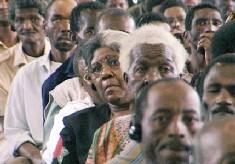Reparations: grants still unclaimed
Matome Sebelebele
23 December 2004
The government has urged about 1 100 South Africans who were declared victims of apartheid by the Truth and Reconciliation Commission (TRC) to claim their outstanding reparations grants.
So far, more than 16 000 apartheid victims have been paid their once-off R30 000 reparation grants.
The victims were identified by the TRC in its final report, handed to President Thabo Mbeki in 2003. The report's recommendations included paying victims of apartheid a once-off amount for the suffering they endured under apartheid.
However, many of the claimants have proven difficult to trace, mainly due to incorrect or changed addresses.
Claimants are urged to call Thabo Mahlakola on (012) 315-1286, Mandla Mokoena on (012) 315-1292 or Sidwel Sibiya on (012) 315-1425.
Justice Department official Farouk Hoosen, an administrator of the President's Fund responsible for grant disbursement, said that "only specific people on the list" should
make the call.
"It must be people who have appeared before the TRC, and who have been allocated a TRC reference number (TRR no)", Hoosen said.
The Government Communication and Information System (GCIS) and the Department of Home Affairs recently located a further 700 beneficiaries through a door-to-door campaign in Limpopo, the Free State, Northern Cape, Eastern Cape and North West.
The campaign is continuing in Gauteng, Mpumalanga, Kwazulu-Natal and the Western Cape.
Home Affairs has established, however, that over 600 of the remaining 1 100 beneficiaries are deceased.
In cases where the victim is deceased
According to regulations governing the reparations, in cases where the identified victim is deceased, the grant will be paid to whoever the urgent interim reparation grant was initially paid out to. (The government had already paid out more than R50-million to 16 500 of the 18 800 victims identified by the TRC as
needing urgent relief.)
"If both the identified victim and the person to whom urgent interim reparation was paid are not alive, then the reparation grant will be paid to the spouse of the identified victim or shared equally among spouses, if there is more than one spouse", the government said in a statement accompanying the regulations.
In cases where the identified victim is not survived by a spouse, the grant will be paid out equally in order of preference to the identified victims' children, the parents or other blood relations of the victim.
"If the victim is not survived by any person, then the money will remain in the Fund."
'No monetary value can be put to life, suffering'
The Commission was set up in 1995 to investigate human rights violations and atrocities committed during apartheid. In over two years of hearings, its committees heard evidence from about 2 000 people, received written statements from another 18 000,
and received over 8 000 applications for amnesty for apartheid crimes.
Among other things, the TRC report recommended the creation of a reparation trust fund, as well as a secretariat in the Presidency to oversee the implementation of the recommendations.
Mbeki received the final two-volume report in February 2003. The first five-volume report was handed to former President Nelson Mandela in 1998.
Speaking in Parliament after receiving the report, Mbeki said that the money, together with material and other rehabilitation packages aimed at assisting apartheid victims and survivors, was in acknowledgement of their suffering and contribution - not as a prize for their role in dismantling the apartheid regime for a democratic system.
He said the government hoped the money would offer "some relief", but added that it was making the payments "with some apprehension".
"We are convinced that, to the millions who spared neither life nor limb in struggle, there
is no bigger prize than freedom itself, and a continuing struggle to build a better life for all.
" ... [A]s the TRC itself has underlined, no one can attach monetary value to life and suffering, nor can an argument be sustained that the efforts of millions of South Africans to liberate themselves was for monetary gain."
It is estimated that the full reparation of apartheid victims will cost around R3-billion, money described by TRC chairperson Archbishop Desmond Tutu as "well-spent and in a very real sense cheap, for their [the victims'] contribution to the stability we currently enjoy is incalculable."
President Mbeki praised the TRC for its work, saying the Commission had succeeded and "handed us a united and reconciled society".
"The pain and the agony that characterised the conflict among South Africans over the decades, so vividly relived in many hearings of the Commission, planted the seed of hope - of a future bright in its humanity and its sense of
caring."
Source: BuaNews


| 
















